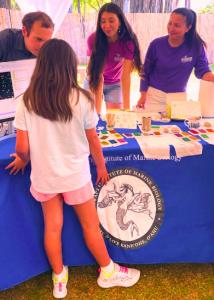UH marine ecologist earns national fellowship
University of Hawaiʻi at MānoaCommunications Coordinator, Hawaiʻi Institute of Marine Biology
Marc Arakaki, (808) 490-3268
Spokesperson/Content Producer, UH Communications
Lisa C. McManus, a theoretical marine ecologist in University of Hawaiʻi at Mānoa’s Hawaiʻi Institute of Marine Biology (HIMB) in the School of Ocean and Earth Science and Technology, was named a 2025 Ecological Society of America (ESA) Early Career Fellow on April 29. The society’s fellowship program recognizes contributions to ecological research, communication, education, management and policy throughout the United States. McManus is among 10 new Early Career Fellows in the country, and is recognized for notable efforts to investigate how climate change impacts coral reef ecosystems.
“I’m deeply honored,” McManus said. “Many ecologists I’ve long admired were previous ESA Early Career Fellows, and it’s humbling to be included among such distinguished researchers. This recognition energizes me to pursue even more ambitious questions at the intersection of theoretical ecology and coral reef science.”
In her research, McManus uses ecological theory to understand and predict the responses of marine organisms to changing ocean conditions. Her current projects examine coral-algal regime shifts, coral adaptive potential and marine conservation strategies. Through this work, McManus aims to inform conservation policies that address the long-term resilience of coral reefs. She earned her PhD in ecology and evolutionary biology from Princeton University.
McManus is an assistant professor at HIMB, where she is part of a team of more than 200 faculty, staff and students who study everything from marine microbes to marine mammals to better understand and protect the ocean, both locally and globally.
“The research community at the Hawaiʻi Institute of Marine Biology is exceptional—not just for the scientific excellence, but for the genuinely supportive culture,” McManus said.
HIMB Director Megan Donahue said, “Lisa has made exceptional contributions to the understanding of coral reef ecology and management, and HIMB has benefited from her open, collaborative approach and strong student mentorship. We are thrilled to see her achievements recognized by this prestigious award from ESA.”
ESA established its Fellows program in 2012, with the goal of honoring its members and supporting their competitiveness and advancement to leadership positions in the society, at their institutions and in broader society. Early Career Fellows are elected for five years, and are members within eight years of completing their doctoral training (or other terminal degree) who have advanced ecological knowledge and applications and show promise of continuing to make outstanding contributions to a wide range of fields served by ESA.
Read the entire story on the HIMB website.



